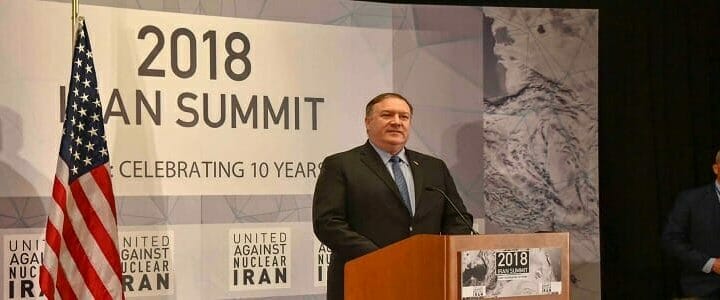Full sanctions against the Iranian regime have been in place for more than a day now, and the world has not come to a screeching halt. In fact, it barely noticed. On Monday, the Treasury Department’s Office of Foreign Assets Control reimposed sanctions against “more than 700 individuals, entities, aircraft, and vessels.” The Iranian regime is now effectively financially cut off from the rest of the world, particularly the Western world.
The office emphasized that these sanctions, reimposed as a result of the U.S. withdrawal from the Joint Comprehensive Plan of Action designed to prevent Iran from acquiring a nuclear weapon, are targeted at the Iranian regime and its leaders, not the Iranian people. “OFAC continues to maintain humanitarian authorizations and exceptions to our Iran sanctions that allow for the sale of agricultural commodities, food, medicine, and medical devices to Iran,” the office said in a press release.
The sanctions had been expected to take 1.7 million barrels of crude oil off the market every day. On Monday, Secretary of State Mike Pompeo spoke publicly about the impact of sanctions on the world oil market. “More than 20 importing nations have zeroed-out their imports of crude oil already,” he said, “taking more than one million barrels of crude oil off the market.” Pompeo reported that the Iranian regime has lost more than $2.5 billion in oil revenue.
But the U.S. government has decided to issue “temporary allotments” to China, India, Italy, Greece, Japan, South Korea, Taiwan, and Turkey. This will allow those countries to continue to buy some Iranian oil without fear of reprisal. Pompeo pointed out that each of those countries had already “significantly reduced” their imports of Iranian crude since the U.S. reimposed the first round of sanctions in May, and two had already completely ended their imports. (One assumes that the temporary allotment in those two cases amount to a simple diplomatic concession).
However, all of the money Iran would have received from those oil sales will be held in foreign accounts. In an effort to keep that money out of the hands of Iran’s terror proxies Hezbollah and Hamas, and its satellite states Syria and Yemen, the U.S. will only allow that money to buy humanitarian or non-sanctioned goods.
What I find most interesting is that the sanctions have not really affected the price of crude oil worldwide, at least yet. Oil prices declined Tuesday for the seventh consecutive trading session, the longest such stretch in nearly two years. Which points to the main reason the U.S. isn’t making more noise over last month’s murder of journalist Jamal Khashoggi in the Saudi consulate in Istanbul.
The U.S. needs Saudi Arabia to ramp up its oil production to offset the removal of Iranian oil from the market.
One 42-gallon barrel of oil actually yields 47 gallons of petroleum products due to expansion in the refining process. Of those 47 gallons of refined products, 20 are gasoline. When you multiply that by 1.7 million barrels of oil, you’re talking about 34 million gallons of gasoline every day. To put that in perspective, if you were to fill a 16-gallon gas tank once a week, it would take you 40,865 years to go through 34 million gallons of gasoline.
But you’re not on the road alone. In August, the U.S. consumed more than 25 million gallons of gasoline… every single day. That’s almost as much as Iran put onto the world market. So you see how important Saudi Arabia (and the rest of OPEC) is to maintaining the world’s oil supply. Last year, Saudi Arabia produced just shy of 10 million barrels of oil per day, exporting about seven of them. It’s currently producing about 10.7 million barrels per day, and claims it can pump more. Crown Prince Mohammed bin Salman has vowed that the kingdom will close the gap left by the removal of Iranian crude.
Iran says he’s bluffing. So far, the markets are siding with MBS. While it might be morally tainted by the Khashoggi murder, removing Iran’s oil from the world market without a hiccup is a win for U.S. foreign policy.




